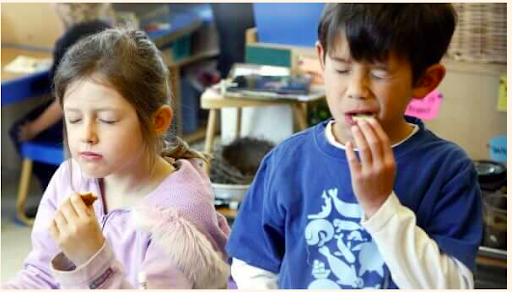Mindful…EVERYTHING!
Eating ONE raisin at a time
(I always offer it with a chocolate chaser)
Start by looking at what you are planning to eat. What do you notice visually?Now, smell the food carefully. What do you notice?
If applicable, do you notice any sounds? If you’re eating something like a raisin, try holding it close to your ear as you squeeze it gently. Or if you’re unwrapping a chocolate, listen to the crinkles of the wrapper as you unfold it.
What do you feel with your fingers? Is the food warm or cold? Is it smooth, rough, or sticky?
Now, put the piece of food on your tongue, but don’t chew on it yet. Just leave it on your tongue and notice how it feels in your mouth. Do you taste anything yet? What activity do you notice in your mouth?
Start chewing it, very slowly, just one bite at a time. Notice how the tastes change as you chew.
Try to notice when you swallow, and see how far you can feel the food into your body.
This is a practice called mindful eating that can infuse your life with an appreciation of living life through the body.
Sweet Buddy
(... and other foster pets)
The company of animals certainly seems to have a healing effect in many of our lives. This is probably partly due to the fact that they don’t judge us in the same way fellow humans do.
They may get annoyed with us if we stroke them the wrong way, but they’ll never judge us for our flaws.
A cat or a dog will never reject us because we eat too much, have credit card debts, or don’t call our mothers as often as we should. It’s not unusual to see dogs sitting beside homeless people on the street.
Our animals love us, even if we don’t love ourselves. In many cases, they embody mindfulness; they are non-judgmentally present in the moment.
When an animal is sitting with us, they aren’t busy thinking about yesterday or tomorrow. They are simply there. This is probably why they have such a special place in many of our lives.
The Teen’s Brain:
It doesn’t matter how smart teens are or how well they scored on the SAT or ACT. Good judgment isn’t something they can excel in, at least not yet.
The rational part of a teen’s brain isn’t fully developed and won’t be until age 25 or so.
In fact, recent research has found that adult and teen brains work differently. Adults think with the prefrontal cortex, the brain’s rational part. This is the part of the brain that responds to situations with good judgment and an awareness of long-term consequences. Teens process information with the amygdala. This is the emotional part.
In teen’s brains, the connections between the emotional part of the brain and the decision-making center are still developing—and not always at the same rate. That’s why when teens have overwhelming emotional input, they can’t explain later what they were thinking. They weren’t thinking as much as they were feeling.
How do we help teens navigate their emotional life?
Our Mindfulness Based Stress Reduction - Teens
(COMMUNITY)
Benefits of Mindfulness for Teens
With an emphasis on present moment awareness of the present moment without judgment, mindfulness can help teenagers manage the stress of school, relationships with peers and family members, and other life stressors.
Mindfulness may be practiced alone or in a group, depending on your teen’s preference.
According to Michelle Hunt, LMHC, a New York-based therapist, the benefits of mindfulness may include:
less distress
decreased impulsivity
increased awareness of self, emotions, and behaviors
improved emotion regulation
According to a 2019 study, mindfulness-based interventions can also help to treat or reduce symptoms of:
anxiety
depression
ADHD
disordered eating (e.g., binge eating and restrictive eating disorders)
chronic pain and illness
sleep issues
stress related to playing competitive sports
In addition, a 2017 study suggests that mindfulness training can cause significant increases in students’ life satisfaction and significant decreases in depression and anxiety. The study also found mindfulness may decrease sleep issues and alcohol consequences.
I’m so happy to be offering a 5-week series of MBSR-T for our Salt Lake City teens. Each Saturday, beginning April 8 and ending on May 6 (which just happens to be my birthday!!)
Giving teens the tools for a better quality of life as they grow is my beautiful work.





